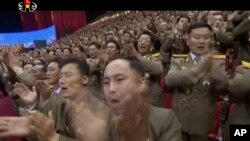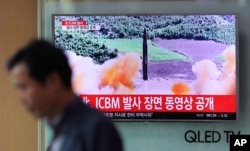A lack of coordination between the European Union and the United States can undermine sanctions against rogue nations, said a new report from the Royal United Services Institute, a British research group.
The report's authors also called for improved guidance for the private sector in implementing the penalties.
The assessment came as the United States pushes for stricter controls following North Korea’s test earlier this month of an intercontinental ballistic missile. Washington wants new sanctions against both Pyongyang and the foreign firms, most of them Chinese, that it says provide North Korea with an economic lifeline.
“We intend to present these firms with a clear choice. You can do business with us or you can do business with North Korea, but you cannot do business with both,” Democrat Senator Chris Van Hollen told reporters Wednesday after presenting a bipartisan bill in Washington.
The fragmented nature of international sanctions, which are enforced separately by the United Nations, U.S. and EU, renders them less effective against Pyongyang, argued report author Emil Dall.
“North Korea relies on a complex network of overseas front companies, shell companies, agents that are acting on behalf of the North Korean regime — people that are simply not captured on sanctions lists,” he said.
Dall noted recent examples of effective coordination. It has been two years since the so-called P5+1 countries — the United States, China, France, Russia, the United Kingdom, plus Germany — agreed on the Joint Comprehensive Plan of Action with Iran. That agreement saw the EU and U.S. lift some sanctions on Iran in return for limits on Tehran’s nuclear program.
The United States and Europe have also implemented coordinated sanctions against Russian individuals and companies following its forceful takeover of Crimea and invasion of eastern Ukraine in 2014.
The nature of the EU means targets are often able to evade its sanctions over time.
“You’ve got all member states who have to agree unanimously to imposing new sanctions. In the European Union, there is also the prospect of legal challenges in the European courts,” said Dall.
He added that U.S. sanctions are more adaptable as rogue states try to evade the measures.
“The U.S. is able to more rapidly put in place new measures and new designations that counteract that," he said. "The solution is closer communication both between the U.S. and the EU on sanctions regimes, but it’s also closer communication with the private sector.”
Britain’s pending EU exit, known as Brexit, complicates the picture further. The report said London will be able to move more quickly in imposing and adapting sanctions outside the bloc — but any measures will have less clout without European enforcement.





